Why do eggplant leaves wither and what to do to save them
Typically, yellowness on plant leaves is a sign of improper care or the development of a fungal disease. In the absence of competent actions on the part of the summer resident, the seedlings will die. Therefore, it is important to know why leaves fade and how to prevent it. This is exactly what our article is about today.
Causes of wilting eggplant leaves
The green part of the seedlings withers for many reasons. Knowing them, you can understand how to solve the problem.
Excess sunlight
Eggplants require sunlight, but an overabundance often leads to leaf wilting. This is easy to detect if the green part of the plants begins to “come to life” in cloudy weather. To avoid such a problem, eggplants are grown in places where direct sunlight reaches only in the morning or evening.
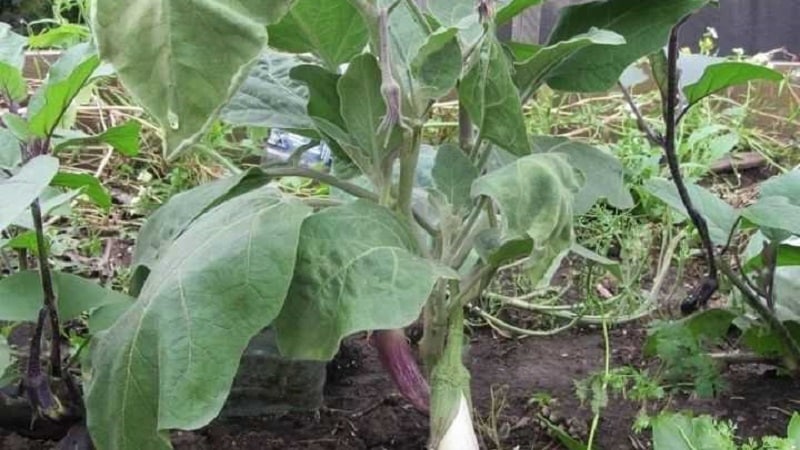
Soil acidification
Soil acidification occurs when it is watered frequently. As a result, moisture stagnates on the surface, which causes plants to wither. To prevent the problem, the soil is regularly loosened and dolomite flour is added to it - it lowers the acidity of the soil and reduces the risk of the spread of rot and mold.
Temperature changes
One of the main mistakes of beginning gardeners is planting seedlings into the ground early. With a sharp change in temperature, the vegetable crop begins to wither, and dies during night frosts. Therefore, seedlings are planted in the garden when stable warm weather sets in and the soil warms up to +15°C.
Diseases
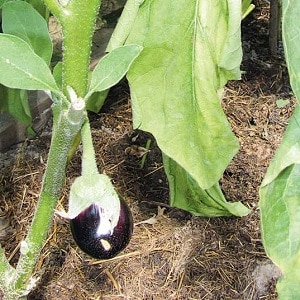 Most often, eggplants are affected by fungal diseases.:
Most often, eggplants are affected by fungal diseases.:
- Verticillium wilt. Usually provoked by large amounts of nitrogen fertilizers. Signs of the disease - wilting from the edges of the leaves gradually moves to the center.
- Fusarium wilt. The leaves wither and dry, then this process covers the entire plant. The reasons are increased humidity, soil acidity, and temperatures above +25°C.
If most of the crop is affected, get rid of diseased plantsso that the disease does not spread to other bushes.
Wilting immediately after transplanting seedlings
The wilting process immediately after picking seedlings associated with the adaptation of culture to new conditions. To help the eggplants tolerate transplantation normally without experiencing stress, work is carried out in warm but cloudy weather. Seedlings are pre-hardened by taking them out into the open air.
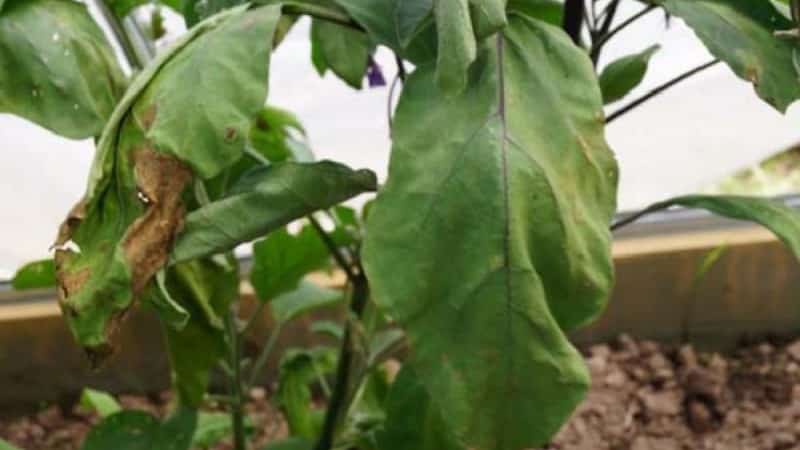
Why do eggplant leaves wither in a greenhouse?
Many gardeners grow eggplants in a greenhouse: there are no drafts or sudden temperature fluctuations. Despite this, plant leaves often begin to wither. This happens for various reasons:
- High humidity levels. Since the space in the greenhouse is very limited, evaporation of water gradually increases the humidity level to levels unacceptable for the crop (above 75%).
- Improper watering. If the humidity level in the greenhouse is high, the eggplants will need less water.
- Lack of air. Due to the limited space in the greenhouse, young seedlings simply do not have enough oxygen. Therefore, they create high-quality ventilation by regularly airing the room.
Read also:
Why do eggplant leaves turn yellow?
In the open ground
During cultivation Vegetables in open ground wither if not properly cared for.: lack of light, too frequent or rare watering, non-compliance with crop rotation.
Advice. Eggplants are planted only where perennial herbs, peas, and cucumbers were previously grown, and only after at least three years.
Fungal diseases lead to leaf wilting. In this case, the green mass first slowly turns yellow, then withers and falls off, and the bushes themselves die.
Why do the leaves of seedlings wither?
If the leaves wither during the day, but in the morning or evening they are in normal condition, this means that this is how the plant reacts to the sun’s rays. If the process is delayed, despite good watering, regular fertilizing and weather conditions, withering is provoked by such factors:
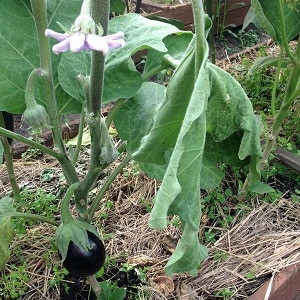 Cold ground. Eggplants take water from the soil through their roots. If the ground temperature is too low, the absorption process is disrupted, which leads to dehydration of the bushes.
Cold ground. Eggplants take water from the soil through their roots. If the ground temperature is too low, the absorption process is disrupted, which leads to dehydration of the bushes.- Lack of moisture. This is evidenced by thin and limp leaves that droop to the ground. To solve the problem, change the watering regime.
- Stress. Often, after picking, the leaves wither due to lack of adaptation to new conditions. With proper care, the problem will quickly be resolved.
- Hypothermia. Occurs when the crop hardens. In this case, the seedlings are watered abundantly with warm water (+28…+30°C).
- Lack of air. Usually caused by soil that is too heavy or lack of drainage holes in the container.
How to save the harvest
Control methods depend on the cause occurrence of wilting:
- If wilting begins after planting, it is usually caused by plant adaptation. Within 1-2 weeks the eggplants will get stronger.
- The crop is planted when it is warm but cloudy outside. To reduce the stress of the bushes, at first the bed is shaded.
- Eggplants are afraid of sudden temperature fluctuations, so they are planted when the threat of frost has passed.
- The problem of stagnant water is solved by regularly loosening the soil and adding dolomite flour to it.
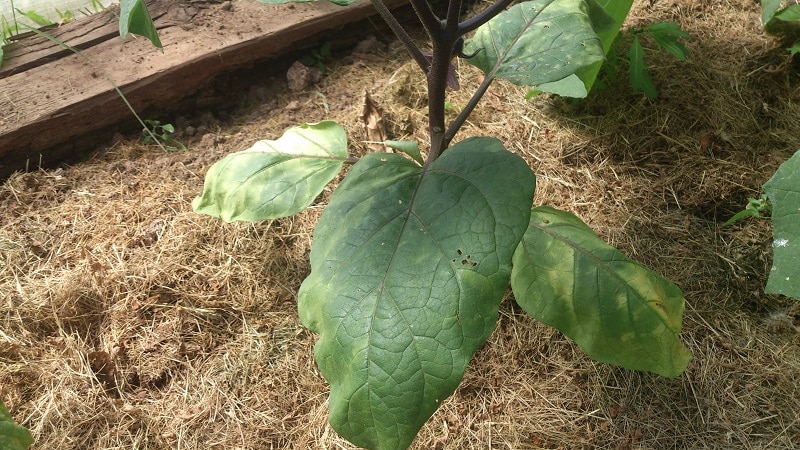
Other methods will help in the fight against fungal infections. To combat Verticillium wilt, they often weed the beds, remove weeds, and do not overfeed the plantings with nitrogen fertilizers. To avoid damage by fusarium, the crop is moistened moderately.
If the seedlings are still sick, they are treated "Vitaros" or "Previkur".
It can be useful:
Prevention measures
To prevent leaf wilting follow the basic rules of agricultural technology for growing crops:
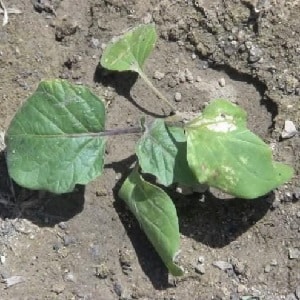 Seedlings are planted only in soil that is well-warmed and cleared of plant debris. The soil is enriched with mineral and organic fertilizers.
Seedlings are planted only in soil that is well-warmed and cleared of plant debris. The soil is enriched with mineral and organic fertilizers.- Follow the fertilizer and watering schedules.
- Before planting in open ground or a greenhouse, seedlings are hardened off for two weeks. To do this, the seedlings are taken outside every day, daily increasing the time they spend in the fresh air.
- For prevention, plants are sprayed with copper-soap emulsion. To prepare it, mix 10 liters of water with 1 tsp. copper sulfate and 2 tbsp. l. grated laundry soap.
- Do not allow the soil to dry out, and when watering, use warm and settled water.
- When planting seedlings in a greenhouse, maintain the temperature at +25...+28°C, and regularly ventilate the room.
Plantings are regularly inspected in order to notice signs of damage in time.. When symptoms of fungal diseases are detected, plants are treated with special preparations.
Advice. Eggplant is a rather demanding crop, so it is important to create comfortable conditions for its cultivation.
Tips from summer residents
Choosing a variety helps a lot to avoid leaf wilting., suitable for cultivation in the region, taking into account its climate and weather conditions.
This the crop is demanding on soil: Grows best in sandy or loamy soils. In other cases, it grows more slowly, produces a small harvest, and requires more careful care.
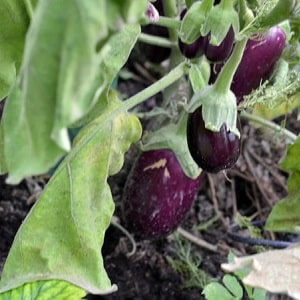 Many summer residents do not grow seedlings in peat pots: despite the fact that they provide plants with nutrients, seedlings in them often wither.
Many summer residents do not grow seedlings in peat pots: despite the fact that they provide plants with nutrients, seedlings in them often wither.
When planting eggplants in open ground, you should not:
- thicken the plants: this will not only lead to wilting of the leaves, but will also significantly reduce the yield;
- overdry the bushes;
- loosen the soil deeply so as not to damage the roots.
For prevention, all tools and containers are disinfected for storing seedlings.
Conclusion
Leaf wilting is a common problem in eggplant cultivation. It is associated with improper care of capricious crops (insufficient shading of plantings, frequent watering, excess fertilizer, unsuitable soil composition), and disease.
It is important to follow the agricultural practices of growing plants and regularly inspect the seedlings in order to begin “resuscitation” measures in a timely manner.